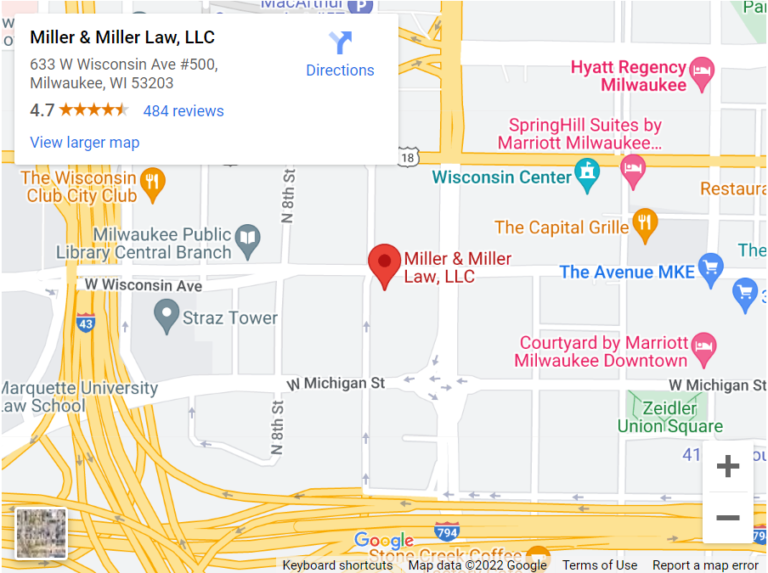Deportation Attorney in Milwaukee, Wisconsin
Starting a new life in a new nation, as well as facing a removal proceeding, is complicated, difficult, and stressful. The good news is that you do not have to face these challenges alone. By providing a wealth of professional skills and knowledge to help you, a loyal, dedicated lawyer can make a tremendous impact.
At Miller & Miller Immigration Lawyers, LLC in Milwaukee, we believe in treating our clients with the dignity and respect that they deserve. Based on the precise facts of your immigration status as well as the grounds for deportation, we can help you determine the most viable method to avoid removal. We will, at the very least, provide you with apt counsel about your options. Our exceptional legal team is dedicated to providing you with exceptional legal representation.
Why do I need a Deportation Defense Lawyer in Wisconsin?
If you are convicted of a felony, you may be deported, which means you may be forced to leave the US. If they break US laws, any immigrants, even those with green cards, can be deported. Proof that they have violated the law is the most typical reason for persons being placed in removal procedures. If an immigrant commits a “crime of moral turpitude” or an aggravated felony, they may be deported. Foreigners who immigrated illegally, overstayed, and/or violated the terms of their visa, or otherwise forfeited their legal status are also vulnerable to deportation. For persons who are not yet citizens of America, due process in deportation proceedings may be limited.
When preparing an immigration-related petition, such as a deportation petition or a waiver request, it is always a good idea to seek guidance and assistance from an deportation attorney. An attorney can also help you find and gather the finest evidence to back up your petition or waiver request.
What is Deportation?

A deportation case can have long-term implications, affecting a foreign national’s future eligibility to enter the US, even if just temporarily, for several years. Since deportation is a serious issue, it is carried out only after the foreign national has been given the right to defend himself in front of an immigration judge. When you or a loved one has been placed in deportation proceedings, it is essential to get legal advice from one of Milwaukee’s experienced deportation attorneys.
Which U.S. government agencies deal with deportations?
The one in charge of immigration enforcement is Immigration and Customs Enforcement (ICE). They would be in charge of making arrests within the States, as well as identifying non-citizens with a criminal conviction and transferring them to the immigration enforcement system after serving their sentence.
The U.S. Citizenship and Immigration Services (USCIS) is in charge of routine immigration matters such as application processing. They can, however, place immigrants in removal proceedings if their requests for lawful permanent residency are denied and are without the legal right to remain in the US.
CBP, or Customs and Border Protection, plays a role as well, monitoring not only the US border but also a considerable land area within, on top of other entry points such as airports and seaports. CBP has the authority to undertake “expedited” removals (without a judge’s hearing) and to refer individuals to the EOIR for removal proceedings.
The immigration court or the Executive Office for Immigration Review (EOIR) makes the final decision in many cases. Non-citizens who do not already have a removal order against them can use this process to fight deportation and legally stay in the country.
Who can be deported by Immigration Authorities?
Most individuals consider undocumented immigrants, sometimes known as illegal aliens, when considering immigrants being deported. This primarily refers to those who entered the US illegally or stayed longer than allowed under the provisions of a temporary (non-immigrant) visa or a visa waiver. Every year, thousands of undocumented immigrants enter and leave the United States. However, they aren’t the only illegal immigrants who may be deported.
Those who break the terms of their legal stay in the US might be deported. This could include a tourist who undertakes a job (which is illegal), a student who does not complete a course of study full-time, or an employee who changes jobs away from the employer who petitioned for them.
Furthermore, those who have not yet become a citizen of the United States, such as green-card holders or permanent residents, can still be removed if they violate any grounds for deportation.
What factors contribute to deportation?
A wide range of criminal convictions has immigration implications. Furthermore, whether a respondent is susceptible to removal, qualified for relief from removal, or qualified to become a naturalized citizen may be determined by the duration and type of punishment. Specific criminal activities, as well as the immigration repercussions of being convicted of them, vary. The following are four of these categories, several of which overlap:
a. Moral Turpitude-Involved Crimes
Moral turpitude offenses are usually those that are regarded intrinsically wrong by our society’s norms. Theft crimes, fraud offenses, criminal offenses, trafficking in a controlled substance, and aggravated DUI are all included in this category (whether felony or misdemeanor). An alien who has been found guilty of a crime involving moral turpitude may be unable to show good moral character, which is required for several forms of relief from removal.
The legislative requirement for good moral character prevents aliens participating in the majority of criminal activity from meeting its requirements. The phrase “good moral character” is commonly used to mean that the individual must demonstrate that his or her behavior is consistent with community standards. Voluntary departure, waiver, cancellation of removal, political asylum, registration, adjustment of status, and naturalization are some of the discretionary relief and other advantages influenced by a crime involving moral turpitude.
For crimes involving moral turpitude, an immigrant could be subject to mandatory detention by Immigration Customs Enforcement (ICE).
b. More serious felonies
Many offenses are included in the definition of an aggravated felony, including some that are classified as misdemeanors by the state. Murder, rape, sexual abuse of a minor, kidnapping, child pornography, and alien smuggling are examples of such crimes; the definition also covers bribery, violence, theft, obstruction of justice, forging documents, and gambling violations with a minimum sentence of one year in jail.
The commission of an aggravated felony is not a reason for inadmissibility, hence there are options for redress. An alien accused of an aggravated felony in the United States is subject to removal (deportation) at any time. Aliens with aggravated criminal convictions are subject to mandatory ICE custody.
c. Offenses involving controlled substances
Some controlled substance offenses are classed as both moral turpitude crimes and severe felonies; others are classified as neither. Controlled substance offenses have their own category under the Immigration and Nationality Act (INA). A controlled substance crime occurs when an alien is found guilty of or admits to committing a violation involving a substance listed in the Controlled Substances Act. Infractions using controlled substances can result in both inadmissibility and removability (being deportable).
Furthermore, if the US government has “reason to believe” that an immigrant was involved in drug trafficking – no arrest or conviction required – the alien may face severe immigration consequences on controlled substance grounds. Convictions for controlled substances result in mandatory ICE detention.
d. Offenses involving firearms
Firearms charges are classified differently under the INA than controlled substance offenses. However, they may also be labeled as aggravated felonies as well. These offenses generally include the illegal use of explosives and the possession, purchase, and discharge of restricted firearms in violation of federal law.
A conviction for a firearms offense does not result in inadmissibility, but it does result in removal (deportation). If the alien is convicted of a firearms offense, ICE may place him or her in mandatory custody.
What are the rights of an immigrant who is about to be deported?
Non-citizens get the right to a lawyer and other rights under the US Constitution. Immigration officials cannot just deport someone else without allowing them to be heard.
Officials usually try to speed up the process by requiring immigrants to sign a document agreeing to leave without a hearing. When an immigrant is in the United States illegally and has no legal defense against deportation, leaving voluntarily may be the best alternative because it avoids a deportation order being placed on one’s record.
Anyone who believes they have a legal right to remain in the United States should insist on a lawyer (which they will have to pay for themselves) and a hearing on the merits of their case.
Non-citizens who have not yet entered the United States are subject to deportation. In other words, unless a person has well-founded threats against returning to his or her own country, he or she can simply be denied entry at the border. In the latter case, immigration officials must listen to the person’s asylum claim. However, under the Trump Administration’s “Migrant Protection Protocols,” which are still in existence under the Biden Administration, first hearings may be held in Mexico.
Administrative proceedings are less formal than regular court proceedings and do not follow the standard rules of proof. USCIS will be represented by a lawyer of its choice. The judge, including both of the attorneys, has the chance to interview the immigrant, and either counsel can bring witnesses to testify.
The hearing will last as long as necessary to present and analyze all evidence. The judge may make a decision right after the hearing or later. If the outcome is unfavorable, the court will issue a removal order, which will be final once the appeal time has passed. Negative decisions could be appealed to the Board of Immigration Appeals (BIA) and then to the federal courts by either party.
Get expert help from our Deportation Attorneys
People who have family members who are being deported understand how traumatic and frightening this experience can be. As a result, we work hard to offer sympathetic representation on such immigration matter – including those at risk of deportation or in detention – so that they have the best opportunity of defending their rights to remain in the United States.
Some people can stay in the United States because they have family members who have legal status. Others may be able to apply for asylum in order to avoid a perilous situation in their own country. Others may be eligible for a different petition if they have been victims of domestic abuse or other sorts of crime. We look into all options for our clients in order to give them the best possibility of winning the case.
Individuals facing federal litigation will be represented in Immigration Court by our experienced immigration attorney. Contact us right now!





